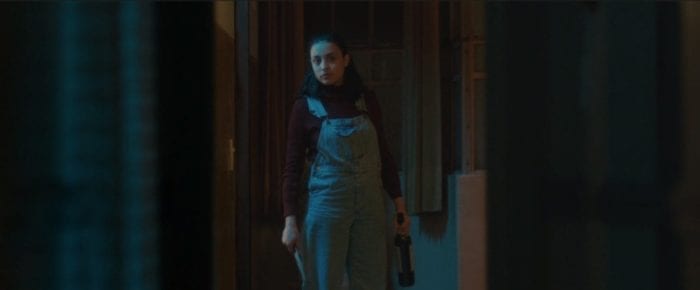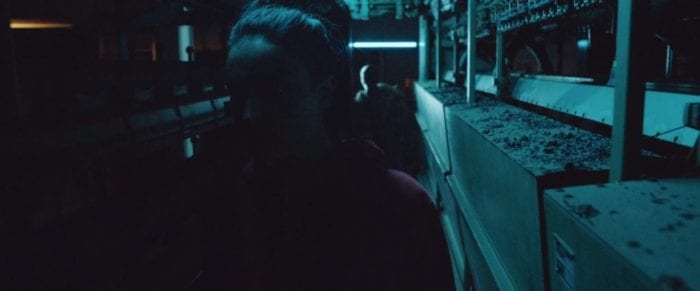Up to a billion children all over the world experience some form of violence, according to the World Health Organization. The effects of that violence extend beyond their childhoods and impact their mental health for years to come. For some abused children, the dysfunction of a parent’s love can become associated with the violence they inflict, and that love can translate into the relationships they form later in life, leading to continuing abuse or perpetuating abuse. How do you break free from continuing the cycle of violence that you have always known?
Patterns of violence are a recurring theme at Salem Horror Fest this year. Just last week, I reviewed K/XI’s Black Lake. Some of the other themes here are remarkably similar, as well, including the power of items to hold bad energy. Federico Gianotti’s Leni is a bit more straightforward in its approach, where Black Lake prefers a more Lynchian angle.
In Leni, after breaking up with her abusive boyfriend, Leni (Ailín Zaninovich), is having trouble sleeping. She wakes herself up night after night with dreams of a dirt-covered monster dragging her into a large pit. Even after she wakes up, hallucinations brought on from micro-naps continue to haunt her. When the event causes Leni to hurt herself and wake up at the sink with a mouth full of blood, she decides to seek help.
Jump scares begin almost immediately in Leni. The few seconds of screen time the monster has in the opening are largely effective in providing a jolt to the viewer. The way the film blends Leni’s waking world and her dreams is well done and establishes empathy for her situation. When she arrives at the hospital and undergoes a CAT scan, we can see the state Leni is in to be a serious issue.
Leni’s doctor says there’s nothing wrong with her and that she’s under a lot of stress stemming from the loss of her mother and the end of her relationship. The doctor also suggests Leni relieve that stress by doing something she loves and brings up Leni’s interest in photography. Leni asks only for sleeping pills, and the doctor reluctantly prescribes them, adding the phone number of a therapist as well.

This is where the film begins to stack setups on top of each other. In the next scene, we see Leni complain to coworker Sofia (Ana Balduini) about her ex’s, Martin’s, stuff that is still all over her apartment. Sofia replies that she needs to get it out of her life, that things can carry negative energy.
As the movie started to set up what appeared to be several plot points, I was afraid this film was going to suffer from too many plot points and not enough story. Having just reviewed fellow Salem Horror Fest film, The Return, I was hesitant of Frederico Gianotti’s plan to get us to the end of the story. Sticking this movie out to the end was a lot easier because the way Leni comes together is a wonderful metaphor for a never-ending circle of violence.
Leni experiences micro-naps while driving home from the pharmacy. She takes a pill but stays up voice messaging Juan (Francisco Macia) anyway. Juan is interested in Leni, but Leni doesn’t seem ready to dive in. They say goodnight, and Leni’s sleeping pill kicks in. The audience can see the monster standing in her bathroom. Leni still looks tired the next day as she meets a financial planner that informs her of some land upstate that has been purchased through the business. Leni insists it must have been her ex because he was in charge of the bookkeeping and had the authority to sign paperwork.
I thought here, with everything mounting against Leni in her current situation, that she was obviously going to head out of the city and something awful was going to occur, like Martin waiting for her or an atmospheric monster movie. Leni’s strict focus of not wanting anything to do with Martin keeps the movie right where it’s set itself, but it only provides yet another plot point we need to follow. That evening, returning home from a self-defense class, Leni sees muddy shoe prints in her hallway, and Martin’s things have been taken. When she decides to settle in for the night, something under her bed frightens her and drags her under. Thinking it’s Martin, Leni leaves the apartment immediately, reconnecting with her sister, Ana (Natalia Santiago), because she doesn’t know who else to call.
From a story perspective, I started to admire the creative way all of these plot points in the film began contracting like the snapback of a rubber band. Coming back to her apartment, Leni sees a box sticking out from under her bed, the same place the monster had grabbed and dragged her. Later, as the movie is reverberating back through its cycle, the box is revealed to be filled with photos of a bruised, battered Leni.

At the start of the film, the doctor says Leni should take more photos because it’s something she loves and could help relieve her stress. But in the box, the pictures are a chronicle of her years of abuse from her ex. Through this box, we see Leni’s old hobby tainted by years of association to the pain she was caused.
As Leni tries to figure out what’s happening to her and puts all of the clues together, every story arc begins closing one right after the other. Leni’s childhood backstory becomes pivotal. As Ana reminds Leni of the trauma she’s forgotten and of how their father would place her inside a box as a punishment. Leni’s claw marks are all over the inside of the box showing where she had desperately tried to escape.
In almost reverse order, the film satisfies its storyline. By the end, it kind of Mementos itself into bringing you back to the beginning. In a way, it’s a genius move. If the end and the beginning are seamless, then this ending could become the start of a whole new cycle.
Overall, writer and director Frederico Gianotti’s Leni is a powerful tale of what the mind will do in order to protect itself in the face of trauma. There are a few pacing issues I could address, but largely the film does a great job of keeping your attention by adding jump scares or foreboding shapes in the background, and the music by Jonathan Gejtman contributes heavily to these moments too.
Leni is playing this weekend as part of the all-virtual Salem Horror Fest 2020’s first weekend. An all-access pass will get you into all 24 premieres, panels, retrospectives, reunions, and more running now through October 11.



